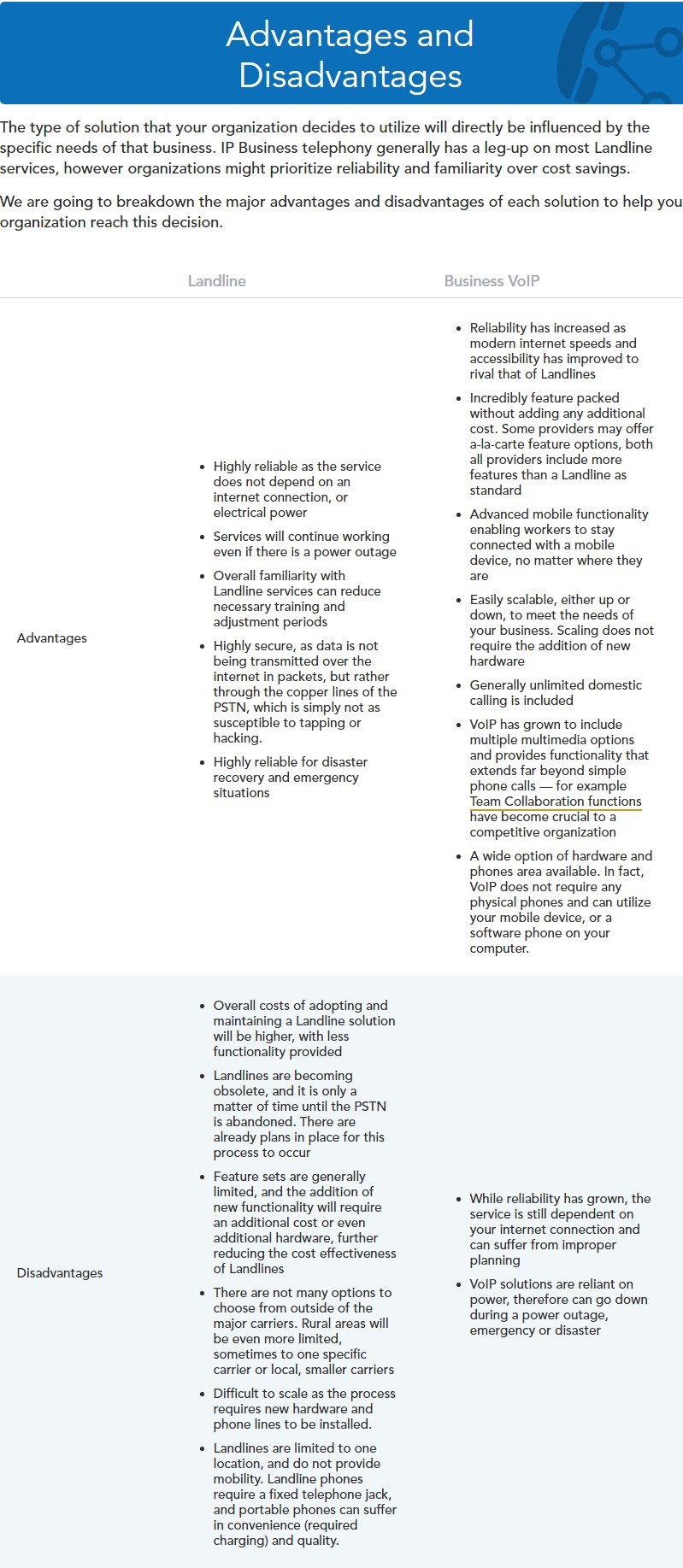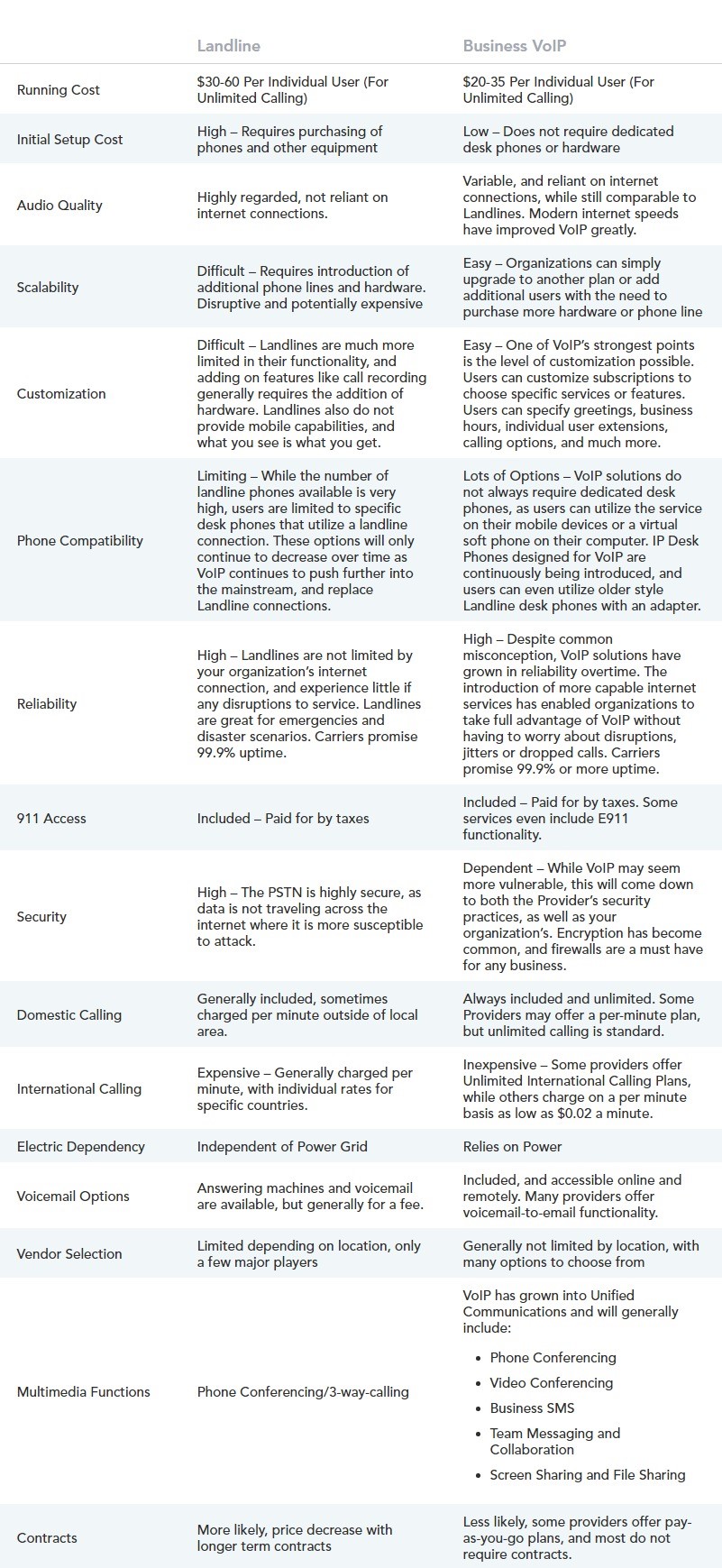Why choose VoIP over landline?

What is VoIP?
Communication is the key to any Business success. A smooth and hassle-free conversation can lead you to a successful Business. Whether the conversation is internal or external you need to have the best communication system for your business. A telephony system is the basis of any communication.
Earlier with landlines, Business communication was very expensive but the technology has grown the system VoIP introduced to the world. Business VoIP system changes the way of communication. The VoIP system is straightforward to install and ready to use. Voice over Internet Protocol has many benefits as they are cheaper in cost and easy to handle with unlimited features.
Choose the right communication system, VoIP over Landline
Let’s get familiar with them to decide which communication system is best for your Business. They both have their pros and cons, so choose wisely. Have a close look at their offering as VoIP and telephony both offer different types of packages.
The landline Telephony system is still making an impact as it doesn’t depend on any Internet network for its communication. So at least you have to keep a limited no. of landline telephones. But as the communication system evolved we found that there is a need for multiple communication channels like video calling, messaging, and emailing, in real-time even if you are not in the office. VoIP helped to make communication easy and smooth. VoIP development companies can do this with ease.
How does VoIP work?
VoIP (Voice over Internet Protocol) works by converting voice signals into digital data packets that can be transmitted over an internet connection. This technology allows for the transmission of voice communication, such as phone calls, over an IP network rather than traditional phone lines.
When making a VoIP call, the analog voice signal is first digitized by an IP phone, computer, or other VoIP-enabled device. The voice data is then compressed and broken down into small packets. These packets are given a unique IP address and are sent over the internet.
At the receiving end, the VoIP system reassembles the packets and decompresses them to retrieve the original voice data. This data is converted back into an analog signal, which is then played through the speaker or receiver, allowing the recipient to hear the voice message.
VoIP utilizes various protocols and technologies to ensure smooth transmission of voice signals, including the Real-time Transport Protocol (RTP) for the transmission of audio packets and the Session Initiation Protocol (SIP) for establishing, maintaining, and terminating VoIP sessions.
One advantage of VoIP is its ability to transmit voice calls and other multimedia content over the same network used for internet access. Additionally, VoIP enables a range of advanced features such as call forwarding, voicemail, call recording, and video conferencing, which are typically more costly or limited with traditional phone systems.
Popular feature of VoIP
One of the most popular features of VoIP (Voice over Internet Protocol) is its ability to provide cost-effective communication solutions. Unlike traditional phone systems that rely on landlines, VoIP uses the internet to transmit calls and messages. This eliminates the need for expensive infrastructure and reduces the cost of long-distance or international calls. Additionally, VoIP often offers unlimited calling plans or lower rates compared to traditional phone service providers, making it an attractive option for businesses and individuals looking to save on their communication expenses. Overall, the cost savings associated with VoIP have contributed to its widespread adoption and popularity.
What equipment do you need for a VoIP system?
To set up a VOIP system, you would typically need the following equipment:
- IP Phones or Softphones: These are the devices used to make and receive calls over the internet. IP phones are physical devices that look and function like traditional phones, except they use the internet to transmit voice data. Softphones, on the other hand, are software applications that run on computers or mobile devices, allowing calls to be made using a headset and internet connection.
- Router: A router is essential for connecting your VOIP system to the internet. It handles the transfer of voice data packets to ensure the quality and reliability of calls.
- Switch: A network switch is used to create a Local Area Network (LAN) within your office or organization. It connects multiple IP phones or computers to the router, allowing them to communicate with each other and connect to the VOIP network.
- PBX (Private Branch Exchange) System: A PBX system is responsible for call routing, call management, and other advanced features like call forwarding, voicemail, and conferencing. In a traditional setup, a physical PBX box would be required. However, with hosted or cloud-based VOIP systems, the PBX functionality is provided by a service provider.
- Internet Connection: A high-speed and reliable internet connection ensures clear and uninterrupted VOIP calls. A dedicated broadband connection or an Ethernet connection is recommended to maintain call quality.
- SIP Trunking: To connect your VOIP system to the public telephone network, you will need SIP (Session Initiation Protocol) trunking services. SIP trunks act as virtual phone lines, allowing your VOIP system to make and receive calls to traditional telephone numbers.
- Firewall: Since your VOIP system relies on the internet, it is important to have a secure network. A firewall helps protect your system from potential security threats and unauthorized access.
- Power Supply and Backup: To ensure uninterrupted service, a reliable power supply is important. Power over Ethernet (PoE) switches can provide power to IP phones through the Ethernet cables, eliminating the need for separate power adapters. Additionally, having backup power sources like uninterruptible power supplies (UPS) can help maintain communication during power outages.
It is worth noting that the specific equipment required may vary depending on the scale and complexity of your VOIP system and the service provider you choose.
Pros and cons of VoIP systems?
Voice over Internet Protocol (VoIP) systems have gained significant popularity recently due to their cost-effectiveness and flexibility. However, like any other technology, VoIP has its pros and cons.
VoIP’s cost-effectiveness is one of its main benefits. Traditional phone systems often require costly hardware installations and additional lines, resulting in high monthly expenses. In contrast, VoIP uses an existing internet connection to transmit voice calls, eliminating the need for separate phone lines and reducing costs. Additionally, long-distance and international calls are usually less expensive with VoIP, making it an attractive option for businesses with global operations or remote employees.
VoIP’s scalability and flexibility are more benefits. With traditional phone systems, adding or relocating phone lines can be a complicated and time-consuming process. VoIP allows businesses to easily add or remove lines as per their requirements and expand or contract their phone system as their organization grows or shrinks. This level of flexibility is particularly beneficial for small businesses that often experience fluctuations in their team size.
Additionally, VoIP systems offer a wide range of features and functionalities that can enhance productivity and collaboration. These can include call forwarding, voicemail-to-email transcription, video conferencing, and integration with other business applications or customer relationship management (CRM) systems. Such features streamline communication processes and enable seamless collaboration, improving efficiency within the organization.
Despite its advantages, VoIP also has some drawbacks. Firstly, since VoIP relies on an internet connection, any disruption in the connection can lead to call quality issues such as dropped calls or interference. This can be particularly problematic in areas with unstable or slow internet connections. Moreover, power outages can render VoIP systems unusable, whereas traditional landline phones may still function during such situations.
Security is another concern with VoIP systems. Voice calls transmitted over the internet can be susceptible to hacking or interception if improperly secured. Companies using VoIP should ensure they have robust security measures in place, such as encryption and firewalls, to protect their calls and data.
We have noted down some differences and packages offered by VoIP over landlines.
Conclusion
Overall, VoIP offers a cost-effective and flexible solution for voice communication by leveraging the power of the internet to transmit voice data efficiently and reliably.
In conclusion, VoIP systems offer significant advantages in terms of cost-effectiveness, flexibility, and productivity-enhancing features. However, potential drawbacks include dependence on a stable internet connection, vulnerability to security breaches, and susceptibility to power outages.
Before adopting a VoIP system, businesses should carefully assess their requirements and potential challenges to make an informed decision.
















